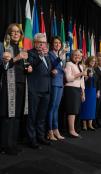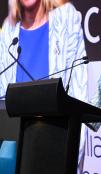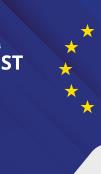Australian Climate and Sustainability Research Gets Boost from European's Union Most Prestigious Research Grant

Australian Researchers Awarded
Professor Bronwyn Parry, who is investigating the intricate relationship between cooling technologies and global warming, said it would be impossible to complete her research without the $16 million in Synergy grants.
‘It would be impossible for us to undertake a project of this scale and complexity without an ERC Synergy grant,’ Prof. Parry said.
‘The funding will enable us to bring together four exceptional teams to undertake fieldwork that is truly global in scale reaching across Europe, SE Asia, India, and the United States.’
The project, spanning 6 years, will engage a world-leading interdisciplinary team, including Prof. Suzana Alpsancar from Paderborn University, Prof. Alexander Friedrich from TU Darmstadt, and Prof. Stefan Höhne from Kulturwissenschaftliches Institut, Essen (KWI).
Prof. Parry said she and her collaborators in Europe regarded it as the most prestigious research grant in all of Europe, due to its level of resourcing, length of support and opportunity to work collaboratively on discipline defining work.
‘So if you want to undertake really ground breaking project this is the best possible destination for you, if you can get one,’ she said.
Fellow recipient Professor Droniou Jerome from Monash University was also a grant recipient winning $13 million (€7.8 million) for 6 years, which will enable him to lead the NEMESIS (NEw GEneration MEthods for Numerical SImulationS) project, which aims to pioneer new-generation numerical methods to tackle the technological challenges of the 21st century, with a primary focus on sustainability.
The Synergy Grants program is a key part of Horizon Europe, with the EU allocating $664 million (€395 million) to 37 research groups worldwide. This initiative aims to address complex global challenges by bringing together diverse expertise, knowledge, and resources.
EU-Australia Collaboration in Research
Research and science collaboration between Australia and Europe is longstanding and fruitful. In 1994, Australia became the first non-EU country to sign a Science and Technology Agreement with the EU. Since then, cooperation has been active and steadily increasing in a diverse range of research areas. Australian universities, companies, and researchers actively contribute to the EU's research programs, such as the Marie Skłodowska-Curie Action, fostering transnational collaboration since 2007. Australia's growing participation in EU research programs is evident in the EU's commitment of €95.5 billion to research, science, and innovation from 2021 to 2027 (Horizon Europe).
Australia's status as the EU's fourth-largest international R&D partner reflects existing collaborations, primarily in joint publications and researcher mobility. Notable achievements include over 140 Australian researchers benefiting from the Marie Skłodowska-Curie Action and successful collaborations in medical research through joint grants with Australia's National Health and Medical Research Council (NHMRC). On average, European and Australian authors collaborate on around 30,000 publications every year.
With the Horizon Europe program serving as a catalyst for innovation and knowledge exchange, the future holds promising prospects for joint endeavours that address global challenges and contribute to sustainable solutions. The achievements of Australian researchers are a clear evidence of Australia’s key role in scientific advancement. Australia and the EU are natural partners in combating global challenges through science.





